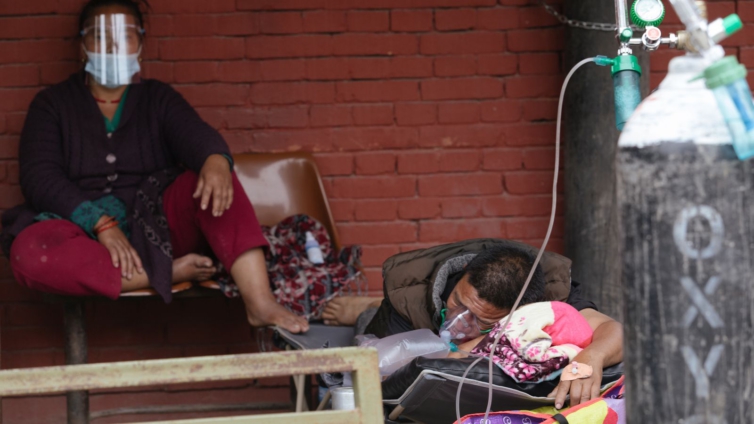Sirens blaring, a military hearse and an escort jeep race through Nepal's capital Kathmandu.
Soldiers dressed in PPE kits have been called to the home of 84-year-old Draupada Bhetwal on the outskirts of the city - she had tested positive for COVID-19 and succumbed to the virus.
Fear of the pandemic has gripped the country and its people. The military has been drafted to pick up bodies of those who have died at homes and hospitals. Hers is the third body they have picked up this morning.
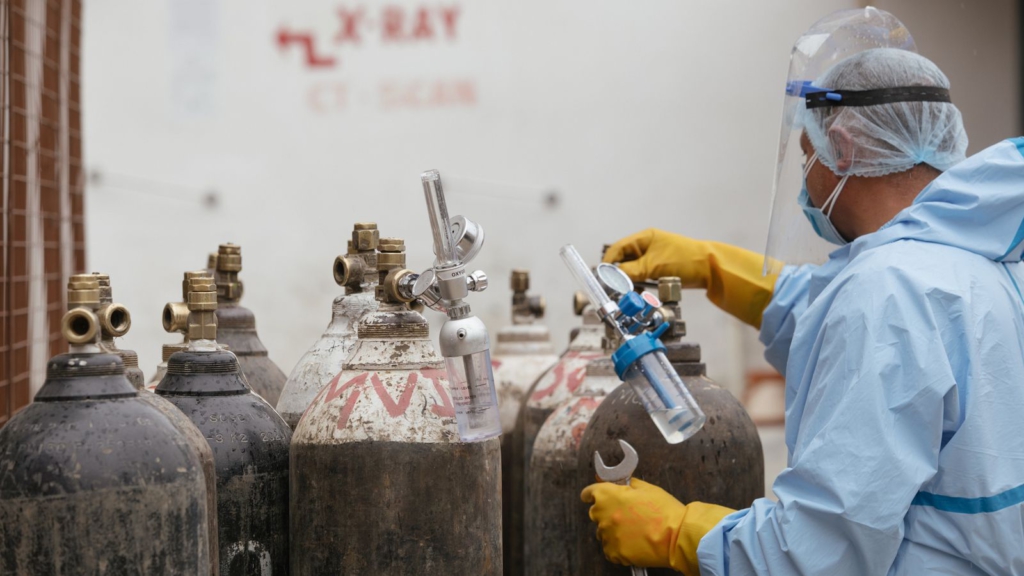
The soldiers take no chances; they disinfect themselves and everything in their path as they carry her body out.
They wait for a few minutes for the family to hurriedly perform the last rites. There is little time for mourning and almost none for rituals in this deeply religious Hindu community.
The pandemic is exploding across the valleys and mountains of Nepal - one of the poorest countries of the world, this impoverished nation is grappling to keep its people alive.
With half a million cases, the country is now in the grip of a deadly second wave. From just 150 cases in a day a month ago, it now records over 8,000 cases in 24 hours.
Public health care in Nepal is woefully inadequate, and non-existent in most rural parts of the country. The pandemic is crushing, and causing a collapse of whatever is left.
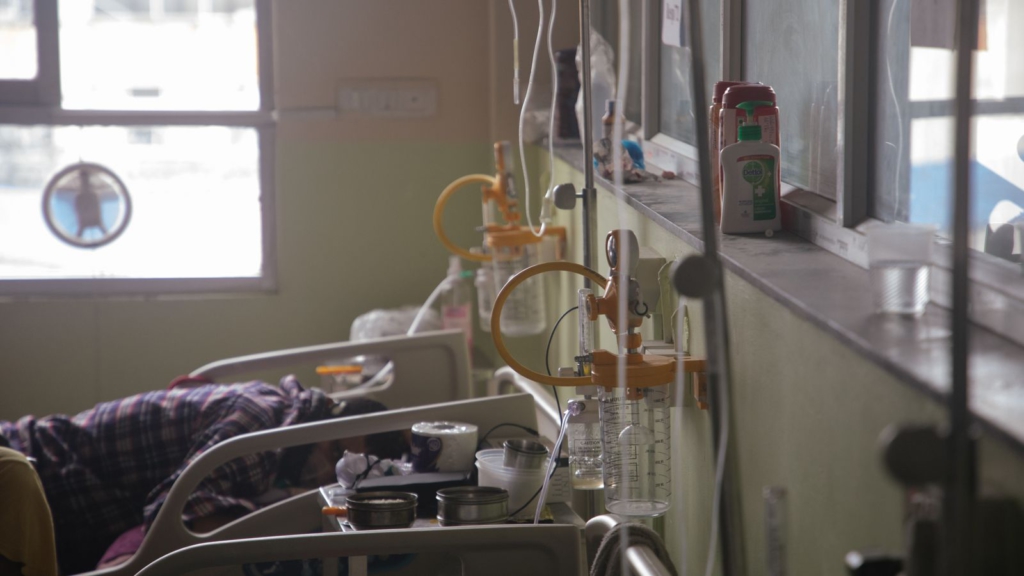
Sky News was given exclusive access to an ICU and a COVID-19 ward at the Tribhuvan University Teaching Hospital.
It's one of the main centres where severe cases are being treated, but the hospital is overwhelmed and overcrowded.
All medical facilities are now grappling with a shortage of intensive care beds, ventilators and oxygen.
Dr Niraj Bam, associate professor of pulmonology and critical care, tells Sky News: "It was very frightening conditions because we didn't have enough preparations in the hospital, and it was beyond our expectations.
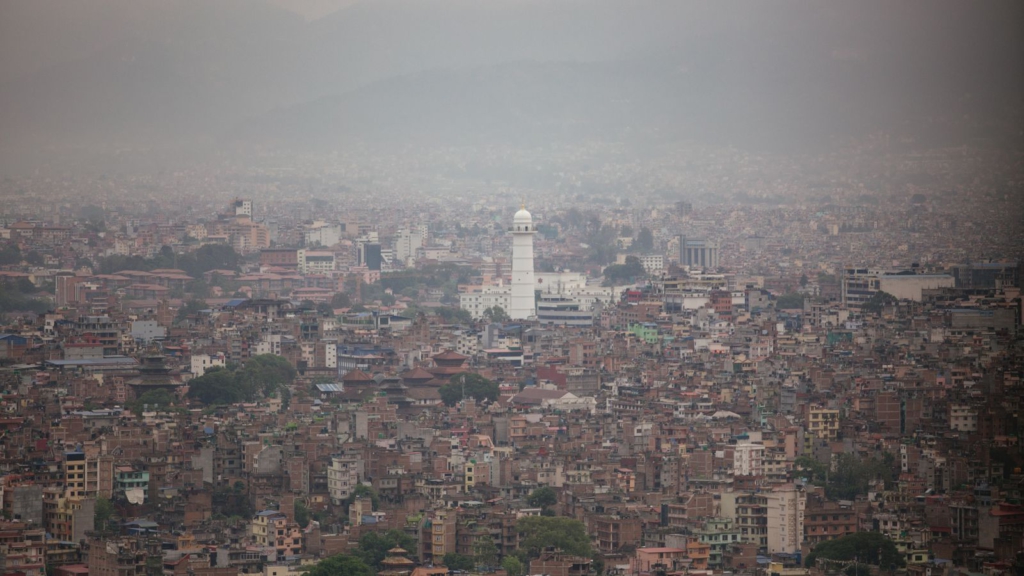
"In the last four weeks we had huge number of cases and we are under very high pressure in Nepal and all our doctors are on high alert."
The Indian variant has been the reason for the deadly second wave. The country has a long and porous border with India, which is still open.
Alina Shreshtra, 52, was critical when she was admitted into the hospital. Her husband Deepak Shreshtra tells Sky News: "We failed to get a bed in other hospitals. She was critical and everyone around is also critical. She saw people die around her and is very scared and depressed."
The Sukraraj Tropical Infections Hospital is full. A makeshift COVID-19 facility has been made outside, which is also overflowing. Patients are attached to oxygen cylinders awaiting their turn for a bed inside while doctors and nurses attend to them and monitor critical levels.
Inside the hospital, wards are overcrowded and all available space is occupied. Attendants have pitched themselves in the corridors.
Hem Bahadur Moktan, 74, had tested positive and has fever and pneumonia. He took a six-hour gruelling journey from his village in Sarlahi to the capital. With no beds available, the family procured an oxygen cylinder and have decided to go back.
His son, Tara Lama, tells Sky News: "There is no bed available here and there so many critical patients. So we have decided to take him back. The doctor has given medicines and told us to use oxygen at home and bring him back if there are any serious complications."
After battling for five days, 73-year-old Subha Ranta Shahi succumbed to the virus while we were at the hospital. The family had spent a few days looking for a bed. His son has passed out due to exhaustion.
Rupesh Khadgi, his son-in-law, told Sky News: "The government didn't build medical infrastructure, there are no plans and when there were so many COVID-19 patients all hospitals got full."
Dr Niraj Bam says: "We started a 50-bed ward which filled up in few hours and then we started a new 10-bed ICU, it filled up within few minutes. We are still facing scarcity of beds with oxygen and especially ICU and ventilators and lots of young people are dying."
Each passing day the death rate is mounting. Just a month ago the daily death rate was seven, it's now close to 200 a day.
The military has been put in charge here, and have taken over the role as undertakers.
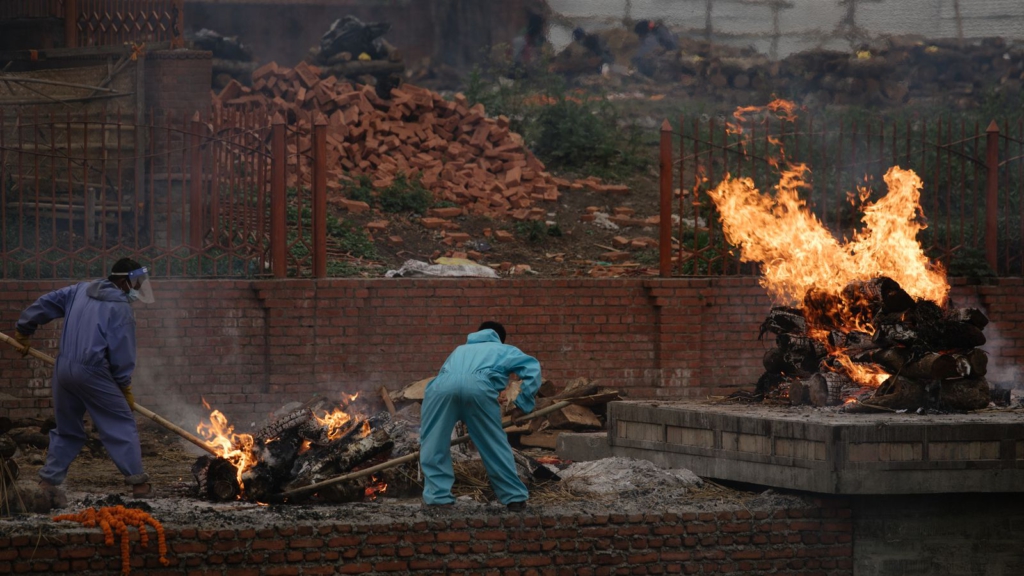
At Pashupati Aryaghat Crematorium, Sky News witnessed an unusually high number of bodies being brought in throughout the day.
To curb infections, families are not allowed inside, they all have to grieve and say their goodbyes from afar.
Aid agencies have warned the country is running out of vaccines. Stocks from India are on hold, and the government has appealed for emergency supplies as more than a million await their second shot. Less than 2% of the population are fully vaccinated.
To make matters worse, the present government lost its majority in the house of representatives. With no political party able to form a government, the president has dissolved parliament and ordered midterm elections in November - all this in the midst of a raging pandemic.
Latest Stories
-
Ghana and India to expand cooperation in trade, agriculture, energy – Mahama
3 hours -
Your visit reaffirms our collective commitment to global peace, prosperity – Mahama tells Narendra Modi
3 hours -
Israel: A divine and historical claim rooted in scripture and truth
3 hours -
Norway fight back to beat Euro 2025 host Switzerland
3 hours -
Anabel Rose unveiled as Fresh Finds Spotify cover for June
3 hours -
Stalled Winneba-Kasoa highway sparks concerns over unpaid contractor arrears
3 hours -
Sean ‘Diddy’ Combs loses bid for release on bail ahead of sentencing
3 hours -
Court discharges lecturer, 2 students over room, bed allocation scandal
3 hours -
Friday Club urges NPP presidential hopefuls to prioritise unity and issue-based campaigning
4 hours -
Court grants bail to TikToker over viral political claims
4 hours -
Youth urges State of Emergency declaration on galamsey at PNAfrica National Youth Mock Parliament
4 hours -
Burning of waste bins and indiscriminate dumping threaten sanitation management efforts – Zoomlion
4 hours -
NPP brutally injured, recovery will take time – Addai-Nimoh
4 hours -
Rastafarian student Oheneba Nkrabea graduates from GIS after Achimota saga
4 hours -
Gov’t heighten monitoring along Black Volta after drowning of Lawra SHS students
4 hours

